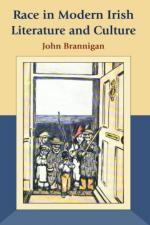|
This section contains 4,264 words (approx. 15 pages at 300 words per page) |

|
SOURCE: "The Nature of the Irish Novel," in Family Chronicles: Maria Edgeworth's Castle Rackrent, ed. by Cóilín Owens, Wolfhound Press, 1987, pp. 41-51.
In the following essay, Flanagan argues that nineteenth-century Irish novels were all written, to some degree, with a propagandist goal of explaining or defending Ireland or the Irish character to an English audience; Flanagan contends that this was the weakest feature of the Irish novel.
Nineteenth-century Ireland1 was a land splintered by divided loyalties and ancient hatreds. Sir Walter Scott, visiting the country in 1825, noted with some contempt: "Their factions have been so long envenomed, and they have such narrow ground to do their battle in, that they are like men fighting with daggers in a hogshead."2 Much later Yeats, writing as an Irishman and in bitterness, would make the same point:
Out of Ireland have we come.
Great hatred, little room,
Maimed us...
|
This section contains 4,264 words (approx. 15 pages at 300 words per page) |

|


